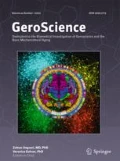Abstract
A third of those over 80 years of age are likely to have dementia, the lack of a cure requires efforts directed at prevention and delaying the age of onset. We argue here for the importance of understanding the cognitive ageing process, seen as the decline in various cognitive functions from adulthood to old age. The impact of age on cognitive function is heterogeneous and the identification of risk factors associated with adverse cognitive ageing profiles would allow well-targeted interventions, behavioural or pharmacological, to delay and reduce the population burden of dementia. A shift away from binary outcomes such as dementia assessed at one point in time in elderly populations to research on cognitive ageing using repeated measures of cognitive function and starting earlier in the life course would allow the sources of variability in ageing to be better understood.
References
Alzheimer’s Disease International. World Alzheimer Report. 2009. Ref Type: Online Source
American Psychiatric Association (2000) Diagnostic and Statistical Manual of Mental Disorders, 4th edn. American Psychiatric Association, Washington DC
Anstey KJ, Luszcz MA, Giles LC, Andrews GR (2001) Demographic, health, cognitive, and sensory variables as predictors of mortality in very old adults. Psychol Aging 16:3–11
Bennett DA, Wilson RS, Schneider JA et al (2003) Education modifies the relation of AD pathology to level of cognitive function in older persons. Neurology 60:1909–1915
Blennow K, de Leon MJ, Zetterberg H (2006) Alzheimer’s disease. Lancet 368:387–403
Brayne C (2007) The elephant in the room—healthy brains in later life, epidemiology and public health. Nat Rev Neurosci 8:233–239
Crystal H, Dickson D, Fuld P et al (1988) Clinico-pathologic studies in dementia: nondemented subjects with pathologically confirmed Alzheimer’s disease. Neurology 38:1682–1687
Elias MF, Beiser A, Wolf PA, Au R, White RF, D’Agostino RB (2000) The preclinical phase of Alzheimer disease: a 22-year prospective study of the Framingham Cohort. Arch Neurol 57:808–813
Gatz M, Pedersen NL, Berg S et al (1997) Heritability for Alzheimer’s disease: the study of dementia in Swedish twins. J Gerontol A Biol Sci Med Sci 52:M117–M125
Gustafson D (2006) Adiposity indices and dementia. Lancet Neurol 5:713–720
Hardy J, Selkoe DJ (2002) The amyloid hypothesis of Alzheimer’s disease: progress and problems on the road to therapeutics. Science 297:353–356
Mayeux R (2003) Epidemiology of neurodegeneration. Annu Rev Neurosci 26:81–104
Morris JC, Storandt M, Miller JP et al (2001) Mild cognitive impairment represents early-stage Alzheimer disease. Arch Neurol 58:397–405
Nelson PT, Braak H, Markesbery WR (2009) Neuropathology and cognitive impairment in Alzheimer disease: a complex but coherent relationship. J Neuropathol Exp Neurol 68:1–14
Ritchie K, Lovestone S (2002) The dementias. Lancet 360:1759–1766
Rose G (1985) Sick individuals and sick populations. Int J Epidemiol 14:32–38
Stampfer MJ, Kang JH, Chen J, Cherry R, Grodstein F (2005) Effects of moderate alcohol consumption on cognitive function in women. N Engl J Med 352:245–253
Stern Y (2009) Cognitive reserve. Neuropsychologia 47:2015–2028
Stern Y, Gurland B, Tatemichi TK, Tang MX, Wilder D, Mayeux R (1994) Influence of education and occupation on the incidence of Alzheimer’s disease. JAMA 271:1004–1010
Voelker R (2008) Guideline: dementia drugs’ benefits uncertain. JAMA 299:1763
Whitmer RA, Sidney S, Selby J, Johnston SC, Yaffe K (2005) Midlife cardiovascular risk factors and risk of dementia in late life. Neurology 64:277–281
Acknowledgements
ASM is supported by a “European Young Investigator Award” from the European Science Foundation and MK by the Academy of Finland and the National Heart, Lung, and Blood Institute, NIH (R01HL036310). Both authors are supported by the National Institute on Aging, NIH (R01AG013196; R01AG034454).
Author information
Authors and Affiliations
Corresponding author
About this article
Cite this article
Singh-Manoux, A., Kivimäki, M. The importance of cognitive ageing for understanding dementia. AGE 32, 509–512 (2010). https://doi.org/10.1007/s11357-010-9147-7
Received:
Accepted:
Published:
Issue Date:
DOI: https://doi.org/10.1007/s11357-010-9147-7

